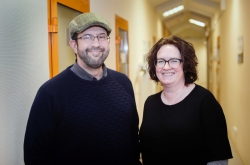The Faculty of Technological Management and Innovations is a somewhat new structure, founded in 2015. Yet, by that time, the entrepreneurship function had already been stated as part of the university’s mission. What did it imply at that time?
If we're talking about the functions of a university, historically they've always been places of education; then, a strong scientific component was added to their role, and, lastly, they got the entrepreneurial function.
The latter implies that universities act as a source of new knowledge and provide for its introduction into real economy, at least during the initial stages, by using all available instruments. In regard to these factors, the changes that have been taking place at ITMO University for the past years are very impressive.
So, what were the first steps towards creating this entrepreneurial component at ITMO University? At some point, we decided that even though our university focuses on research, it has to be more entrepreneurial in its activities. This implied both possession and use of the instruments necessary for development of entrepreneurship and the willingness to take risks related to investment of in-house resources into new fields.
A university’s ability to change depends greatly on its Academic Board’s way of thinking. To my mind, it is thanks to the entrepreneurial approach that ITMO started to develop those new fields that it never focused on before, like the Biochemistry Cluster that is now comprised of a whole network of international laboratories. Actually, if not for that, we wouldn’t even have started to work in the field of Computer Science back in the 90’s.
 ITMO's Biochemistry Cluster
ITMO's Biochemistry Cluster
When did the university begin to make its first steps towards developing an entrepreneurial ecosystem? What were its most remarkable achievements in the recent years?
As for entrepreneurial instruments and the development of an entrepreneurial ecosystem in particular, it all began some 10 years ago. In 2007, the QD students’ business incubator launched at ITMO University. At that time, it was almost entirely virtual and consisted of motivated students under the guidance of one of ITMO’s lecturers, Maria Sukhorukova; this group began to study our Western colleagues’ best practices to learn how to apply them at our university. This gave birth to QD’s unofficial venture fund, which consisted of ITMO graduates who occasionally invested in student projects. In essence, this was the beginning of entrepreneurial activities at the university.
In 2009, ITMO became a National Research University; it invested a considerable amount of funding into innovations and entrepreneurship, and continued doing so over the next five years. At that time, first small innovative enterprises started to appear at ITMO. Once, there were only three of them; now, there are around 50. The number changes constantly as new projects emerge, and the university sometimes sells its share in enterprises that have successfully made it to the market.
In 2010 the university began to actively collaborate with its Western colleagues, such as the University of California, Los Angeles (UCLA) and their startup accelerator. The universities set up joint startup schools and exchanged experience on a regular basis. This allowed us to better understand foreign practices and apply some of them in Russia.
 DemoDay at ITMO University
DemoDay at ITMO University
In 2013, when ITMO University became part of Project 5-100, the university continued to develop entrepreneurship and innovations; the Future Technologies acceleration program was launched. Developing an acceleration program for startups based on science-intensive fields developed at our university was a most difficult task; yet, we succeeded in it, and today our students apply for funding to such organizations as Skolkovo and the Innovation Promotion Fund, which gives them opportunities to proceed with their projects. In the past years, there were lots of such projects, some 10-15 projects each acceleration session. This year, their amount has grown by almost two times - there were 25 such projects, which is reflective of their current demand.
At the same time, we’ve been developing other entrepreneurship promotion mechanisms, as well. Though they might be not as apparent as acceleration programs, those were important projects that have to do with education in the field of entrepreneurship. We’ve introduced a series of such projects in collaboration with the Russian Venture Company. For instance, we’ve developed the special “Innovative economics and technological entrepreneurship” course, which aims to introduce entrepreneurship competencies into the educational process, as well as to further train university lecturers. We’ve also launched a Master’s program on technological entrepreneurship. This is a milestone event for ITMO, as we were the first Russian university to launch the “Startup Instead of a Diploma” program, and as soon as in 2016 this initiative was already being promoted on a federal level.
Why have we been focusing on all that for some ten years in a row? Why did we position ITMO as a venture capitalist that invests resources, provides acceleration programs, facilities and infrastructure? Because in 2007, universities had none of that. The institutions aimed at developing such infrastructure - Skolkovo, ROSNANO, Russian Venture Company and the like - were only being launched.
 Nina Yanykina
Nina Yanykina
We were well aware that if we were to leave our inventions as they were and just let them into the market, they would practically enter “the valley of death”. We knew that we had to develop a whole system of services to support our projects until they are “mature enough” to be able to continue on their own. It was only in the recent couple of years that such infrastructures have more or less developed in Russia.
It was this year when yet another decision to transform ITMO’s business incubator has been made. Why now, and what do you plan to focus on in the nearest future?
As I’ve already said, the ecosystem for innovations is now more or less developed in Russia. The rules and requirements for getting grants and subsidies for the initial stages of science-intensive business are now common knowledge, Skolkovo has been completed, and is a great infrastructure. Nanocenters work in full force, as well. In St. Petersburg, we now have the Ingria business incubator not far from ITMO University, which, too, offers all the necessary conditions. So, we as a university no longer have to perform this function that’s usually not a university’s domain.
We are also now seeing that, in the modern conditions of universal digitalization, when outsourcing has become a common trend, startups no longer have to remain within the framework of some single business incubator. They can complete an acceleration program and then leave for new platforms. So we’ve made the decision to transform our business incubator, change our approach. We will no longer follow the classical model where we provide facilities and services, though we will continue to develop co-working spaces where students have the opportunity to communicate, attend lectures, workshops, and other similar events.
 ITMO's School of Technology Brokering
ITMO's School of Technology Brokering
As of now, we’ll be focusing on developing entrepreneurial skills and competencies, as well as building teams through the use of instruments offered by acceleration programs. As entrepreneurship has now become part of most of the university’s activities, our task is to organize it as efficiently as possible, so that each of the university’s buildings would have some place, some access point where students can come if they become interested in entrepreneurship. And that will become possible thanks to the introduction of comprehensive modules on development of innovative thinking, as well as entrepreneurial competencies and culture, into the educational process.
How do you plan to introduce this initiative? Who will be developing these modules?
Starting in 2018, every ITMO student will have the opportunity to learn and apply entrepreneurial skills and knowledge as part of their individual educational path. That will include business modeling, team building, soft skills, company economics, investment attraction and other related competencies that we train during acceleration programs, yet in a better, more advanced format.

All of that will become the responsibility of the Faculty of Technological Management and Innovations, which has already started to transform in accordance with these tasks and will at some point change its name, as well. Such concepts as entrepreneurship, management, the economics of innovation, technology transfer and intellectual property will still be part of its focus, yet it will become a totally different structure from what it is now.
How exactly will the Faculty’s structure change?
We’ll be having lots of transformations and changes aimed at improving the quality of education - training highly competent students who participate in our acceleration programs and the academic staff that works with them.
Such changes stem from two serious decisions by ITMO’s Academic Board that have been made in the course of the last three months. One is the merging of the Faculty of Technological Management and Innovations and the Faculty of International Business and Law, and the other is turning two of the former Faculty of Management and Automation Controls’ departments over to this newly formed structure. Thus, there will be over ten departments which focus on commerce and personnel management at the new Faculty, which means over 2,000 students and 200 staff.
There’ll be some innovations to the newly created structure, as well. Those are necessary mostly due to the Faculty’s focus being quite untypical of ITMO University. Due to that, the possibility of it becoming the University’s fifth School has already been widely discussed. However, we do understand that to become a separate School, the Faculty has to possess considerable groundwork in terms of scientific activities, including international research, reinforced with corresponding results.

As for now, it is still not sufficient, but we encourage project activity and research as a whole. The integration of the new Faculty with the Project Management and Innovation Department will also contribute to this process.
How will this integration be carried out?
First of all, I want to note that the activity of the Project Management and Innovation Department has three focuses. The first is entrepreneurship as it is - working with the university’s accelerator, small innovative enterprises and startups. The other is services that have to do with fundraising, investment attraction and positioning, like presenting projects at innovation forums. The third has to do with engineering activities, and is related to the work of the OLIMP Laboratory and ITMO’s Engineering Center.
 ITMO's Engineering Center
ITMO's Engineering Center
Such a system can be easily merged with that of the Faculty of Technological Management and Innovations. What is more, we are already collaborating on a series of educational programs - students come to us to work on particular projects, to get practical experience, and often stay with us throughout their time at ITMO University. Many use these projects as basis for their Master’s theses.
This is exactly why we aim to integrate our activities, and develop an additional educational module that will not just have its own educational programs, but also provide training in innovative thinking and entrepreneurial competencies for the whole university.
Which tasks will such integration help solve?
All of these initiatives have two objectives: on one hand, they will allow us to avoid duplicating the systems’ functions, and, on the other - improve the products we work on.
Thus, each student or staff member will have an opportunity to partake in the university’s entrepreneurial activities. They will also get better opportunities to perfect their products and attract funding. Integration will also solve the issue of having people with projects and ideas who are ready to work on them, but don’t know what to start with, all while there’s a specialized structure as near as the next building that can help them with it.
 ITMO's Engineering Center
ITMO's Engineering Center
I’d like to note that we already have similar structures that show the advantages of this kind of integration. For example, we have a similar practice at the Department of Financial Management and Audit where students come to scientists to learn about their projects so that they can take up those ideas and start working on financial feasibility studies.
What is more, we already had a collaborative project with the Faculty of Technological Management and Innovations, when we chose projects from the university’s pool of inventions and gave them to the students to work with. As a result, the developer team got an understanding of where and how certain inventions could be applied. Our current task is to systematize such activities.
So the education process will focus on a project approach?
Yes, and the other important change is that we will be adopting a program-based approach to managing the faculty instead of the former, department-based approach. What does this mean? Right now we have departments that offer corresponding programs, which is the traditional system. So, why change it? There are several reasons to do that.
 Faculty of Technology Management and Innovations
Faculty of Technology Management and Innovations
First of all, this will help make the Faculty’s overall structure a lot more comprehensible. The program approach will also give every lecturer an opportunity to fulfill themselves. They will no longer be restricted by the standards set by a department or some particular educational program. Now, those in charge of a particular program will have the opportunity to choose lecturers for every subject, and even invite specialists from other departments.

How long will it take to transform the Faculty’s structure?
This will be our task for the upcoming year. Still, the concept should already be finalized by mid-January. As of now, all of the Faculties are working on new development strategies, so we, too, have to finalize the Faculty’s development strategy and present it to the Academic Board.





